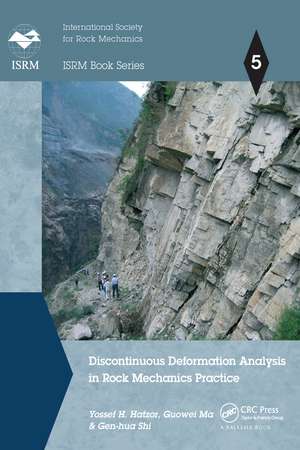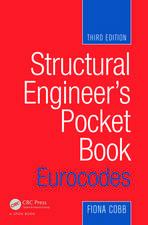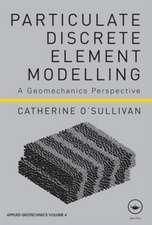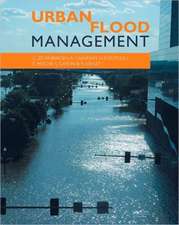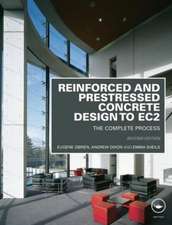Discontinuous Deformation Analysis in Rock Mechanics Practice: ISRM Book Series
Autor Yossef H. Hatzor, Guowei Ma, Gen-hua Shien Limba Engleză Paperback – 30 iun 2021
In this book Yossef H. Hatzor and Guowei Ma, co-chairs of the International Society for Rock Mechanics (ISRM) Commission on DDA, join Dr. Shi in authoring a monograph that presents the state of the art in DDA research. A comprehensive discussion of DDA development since its publication is provided in Chapter 1, followed by concise reviews of 2D and 3D DDA in chapters 2 and 3. Procedures to select geological and numerical input parameters for DDA are discussed in Chapter 4, and DDA validation and verification is presented in Chapter 5. Applications of DDA in underground and rock slope engineering projects are discussed in chapters 6 and 7. In Chapter 8 the novel contact theory recently developed by Dr. Shi is published in its complete form, for the first time.
This book is published within the framework of the ISRM Book Series and is the contribution of the ISRM DDA Commission to the international rock mechanics community.
| Toate formatele și edițiile | Preț | Express |
|---|---|---|
| Paperback (1) | 509.58 lei 6-8 săpt. | |
| CRC Press – 30 iun 2021 | 509.58 lei 6-8 săpt. | |
| Hardback (1) | 882.45 lei 6-8 săpt. | |
| CRC Press – 27 iul 2017 | 882.45 lei 6-8 săpt. |
Preț: 509.58 lei
Preț vechi: 599.50 lei
-15% Nou
Puncte Express: 764
Preț estimativ în valută:
97.51€ • 102.08$ • 80.68£
97.51€ • 102.08$ • 80.68£
Carte tipărită la comandă
Livrare economică 05-19 aprilie
Preluare comenzi: 021 569.72.76
Specificații
ISBN-13: 9781032096650
ISBN-10: 1032096659
Pagini: 410
Dimensiuni: 174 x 246 x 21 mm
Greutate: 0.7 kg
Ediția:1
Editura: CRC Press
Colecția CRC Press
Seria ISRM Book Series
ISBN-10: 1032096659
Pagini: 410
Dimensiuni: 174 x 246 x 21 mm
Greutate: 0.7 kg
Ediția:1
Editura: CRC Press
Colecția CRC Press
Seria ISRM Book Series
Public țintă
Postgraduate, Professional, and Professional Practice & DevelopmentCuprins
Introduction. Theory of DDA. Three Dimensional DDA. Geological Input Parameters for Realistic DDA Modeling. DDA Verification and Validation. DDA in Rock Tunneling Engineering. DDA in Rock Slope Engineering. Current Trends and Future Developments. Appendix: Manual for DDA Programs. Program DDA LINE (DL). Program DDA CUT (DC). Program DDA FORWARD (DF).
Recenzii
"This book brings the extraordinary power of DDA (Discontinuous Deformation Analysis) to the tool-baskets of engineers who are responsible for excavations and foundations in jointed and faulted rock masses. The mathematical basis for DDA originated in the brilliant PhD Dissertation and subsequent publications of Gen-hua Shi, and has been furthered by many applications in recent years. These include Professor Hatzor’s resourceful analyses of works needed to protect ancient surficial and underground structures in Israel. Important developments have been published in the proceedings of the International Assoc. for Computer Methods and Advances in Geomechanics, and in other recent engineering literature. With this book, the potential applications of DDA will be further recognized and applied for the benefit of the entire engineering community."
Professor Richard E. Goodman, Professor Emeritus at the department of Civil and Environmental Engineering, University of California, Berkeley.
Professor Richard E. Goodman, Professor Emeritus at the department of Civil and Environmental Engineering, University of California, Berkeley.
Descriere
DDA is a numerical evolving method in rock mechanics practice. While the theory is covered in Shi’s book which was published in 1993, the verification, validation, and application of the method have not yet been presented in a concise form to professionals and students of rock mechanics and rock engineering. This book is intended to bridge the gap
